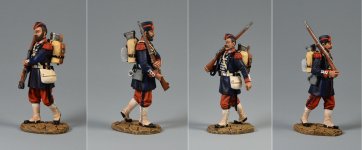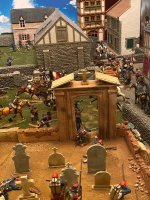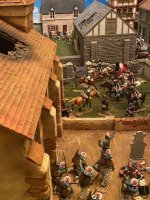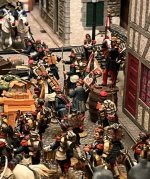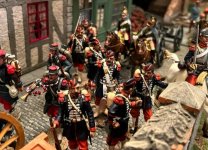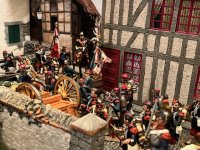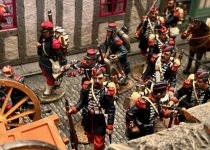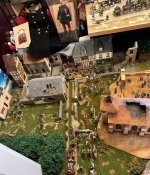TeamMiniatures
Private 1st Class
- Joined
- Oct 21, 2019
- Messages
- 177
Hello, Collectors!
This month our new product is the French Grenadiers of the Franco-Prussian War. The dioramas we designed for the figures look "peaceful", but their hearts are not "peaceful". We've designed some dialogues for this, and you could imagine the ones you think are appropriate. It's going to be an interesting scenario!
On August 14, 1870, Bazaine ordered the beginning of the retreat from Metz to the west in the direction of Chalon. No sooner had the French retreated than the Prussians caught up with them. The fighting took place near Borny and Colombey, villages east of Metz.
In terms of casualties, it was a victory for the French. They inflicted nearly 5,000 casualties on the Prussians and less than 4,000 themselves in a well-prepared field of battle. Bazaine did not take advantage of the superior forces to launch a counterattack, to give the Prussian Army a bigger blow to expand the gains.
On the 15th the French Army, which had been delayed for a day, resumed its retreat westward towards Chalon. The road from Metz to Verdun and Sedan was full of Prussian Cavalry. On the night of the 15th the vanguard of the Prussian 2nd Corps pushed up their guns. They opened fire on the French encampment early on the 16th. The sound of the cannon also surprised General Bazaine at Gravelotte, who had been under the impression that Moltke was going to dislodge him from his fortified position at Metz and meet him in the field.
In fact, contrary to his judgment, General Moltke, who was short of troops, hoped that Bazaine would not leave Metz, and that he would not join MacMahon or Trochu's reserves at Chalon, and remain at Metz.
With this judgment in mind, Bazaine set up his headquarters at Gravelotte, 20 kilometers from Metz. Rounded up the army, and placed three armies round him, and set up a field for the Prussians to attack. In fact, he still had a military advantage at that time. The morale of the French was not bad either. This passive approach disappointed many of his men: "The battle in Metz is very important for us, and we need to prove here to our Allies and Enemies that we can win." Moltke and Bismarck also wanted a quick battle to prove that it was the Prussians who could win quickly.
The battle has been going on ahead in Marlatour. Faced with a retreat Bazaine hesitated to stay behind Gravelotte. If Bazaine had been on the front line, he might have been able to launch a counterattack in time to take out the currently isolated Prussian 3rd Army. But Bazaine did not do this, but made the army shrink towards him.
The battle ended in a tie. Neither side succeeded in taking the other's position during the day, but both sides claimed victory of their own. The real loser was Bazaine, who had robbed the French of what might have been a victory. Bazaine could have pinned down the Prussian Rear with his 3,0000 troops at Metz. The presence of Metz fortress and its defenders threatened the Prussian Army's communication and supply routes. At that time Bazaine's orders to his troops were: "Because of the high consumption of Infantry and Artillery ammunition. We shall be withdrawing to Plappeville, high ground north of Metz, starting at four o 'clock in the morning on the 17th." At this command, the French soldiers expressed their bewilderment, and thus the following scene was created:
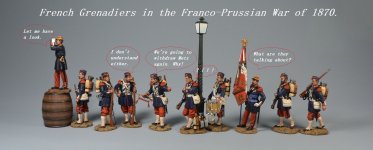
The Emperor's Imperial Guard constituted the epitome of the Second Empire and the Grenadiers stood at its epogge, the direct descendants of the great Napoleon's Guards. In their white-laced blue coats and red baggy trousers, they began the campaign wearing their imposing bearskins but replaced these by the far more utilitarian bonnet de police by the end of July.
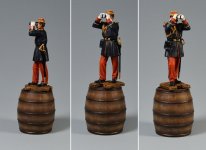
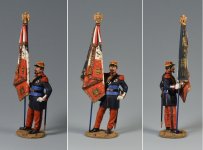

Hope you will enjoy these new figures! Have a great weekend!
T.M. Jack
This month our new product is the French Grenadiers of the Franco-Prussian War. The dioramas we designed for the figures look "peaceful", but their hearts are not "peaceful". We've designed some dialogues for this, and you could imagine the ones you think are appropriate. It's going to be an interesting scenario!
On August 14, 1870, Bazaine ordered the beginning of the retreat from Metz to the west in the direction of Chalon. No sooner had the French retreated than the Prussians caught up with them. The fighting took place near Borny and Colombey, villages east of Metz.
In terms of casualties, it was a victory for the French. They inflicted nearly 5,000 casualties on the Prussians and less than 4,000 themselves in a well-prepared field of battle. Bazaine did not take advantage of the superior forces to launch a counterattack, to give the Prussian Army a bigger blow to expand the gains.
On the 15th the French Army, which had been delayed for a day, resumed its retreat westward towards Chalon. The road from Metz to Verdun and Sedan was full of Prussian Cavalry. On the night of the 15th the vanguard of the Prussian 2nd Corps pushed up their guns. They opened fire on the French encampment early on the 16th. The sound of the cannon also surprised General Bazaine at Gravelotte, who had been under the impression that Moltke was going to dislodge him from his fortified position at Metz and meet him in the field.
In fact, contrary to his judgment, General Moltke, who was short of troops, hoped that Bazaine would not leave Metz, and that he would not join MacMahon or Trochu's reserves at Chalon, and remain at Metz.
With this judgment in mind, Bazaine set up his headquarters at Gravelotte, 20 kilometers from Metz. Rounded up the army, and placed three armies round him, and set up a field for the Prussians to attack. In fact, he still had a military advantage at that time. The morale of the French was not bad either. This passive approach disappointed many of his men: "The battle in Metz is very important for us, and we need to prove here to our Allies and Enemies that we can win." Moltke and Bismarck also wanted a quick battle to prove that it was the Prussians who could win quickly.
The battle has been going on ahead in Marlatour. Faced with a retreat Bazaine hesitated to stay behind Gravelotte. If Bazaine had been on the front line, he might have been able to launch a counterattack in time to take out the currently isolated Prussian 3rd Army. But Bazaine did not do this, but made the army shrink towards him.
The battle ended in a tie. Neither side succeeded in taking the other's position during the day, but both sides claimed victory of their own. The real loser was Bazaine, who had robbed the French of what might have been a victory. Bazaine could have pinned down the Prussian Rear with his 3,0000 troops at Metz. The presence of Metz fortress and its defenders threatened the Prussian Army's communication and supply routes. At that time Bazaine's orders to his troops were: "Because of the high consumption of Infantry and Artillery ammunition. We shall be withdrawing to Plappeville, high ground north of Metz, starting at four o 'clock in the morning on the 17th." At this command, the French soldiers expressed their bewilderment, and thus the following scene was created:

The Emperor's Imperial Guard constituted the epitome of the Second Empire and the Grenadiers stood at its epogge, the direct descendants of the great Napoleon's Guards. In their white-laced blue coats and red baggy trousers, they began the campaign wearing their imposing bearskins but replaced these by the far more utilitarian bonnet de police by the end of July.



Hope you will enjoy these new figures! Have a great weekend!
T.M. Jack




